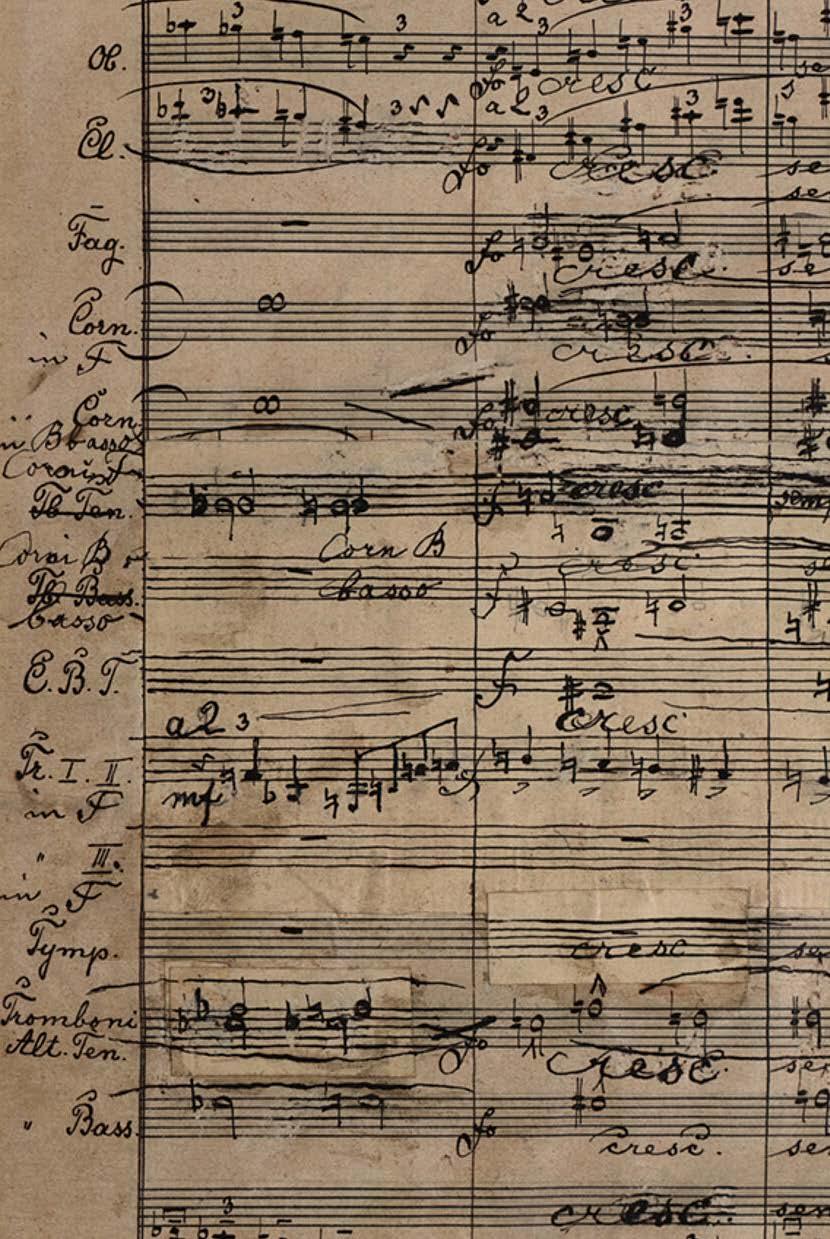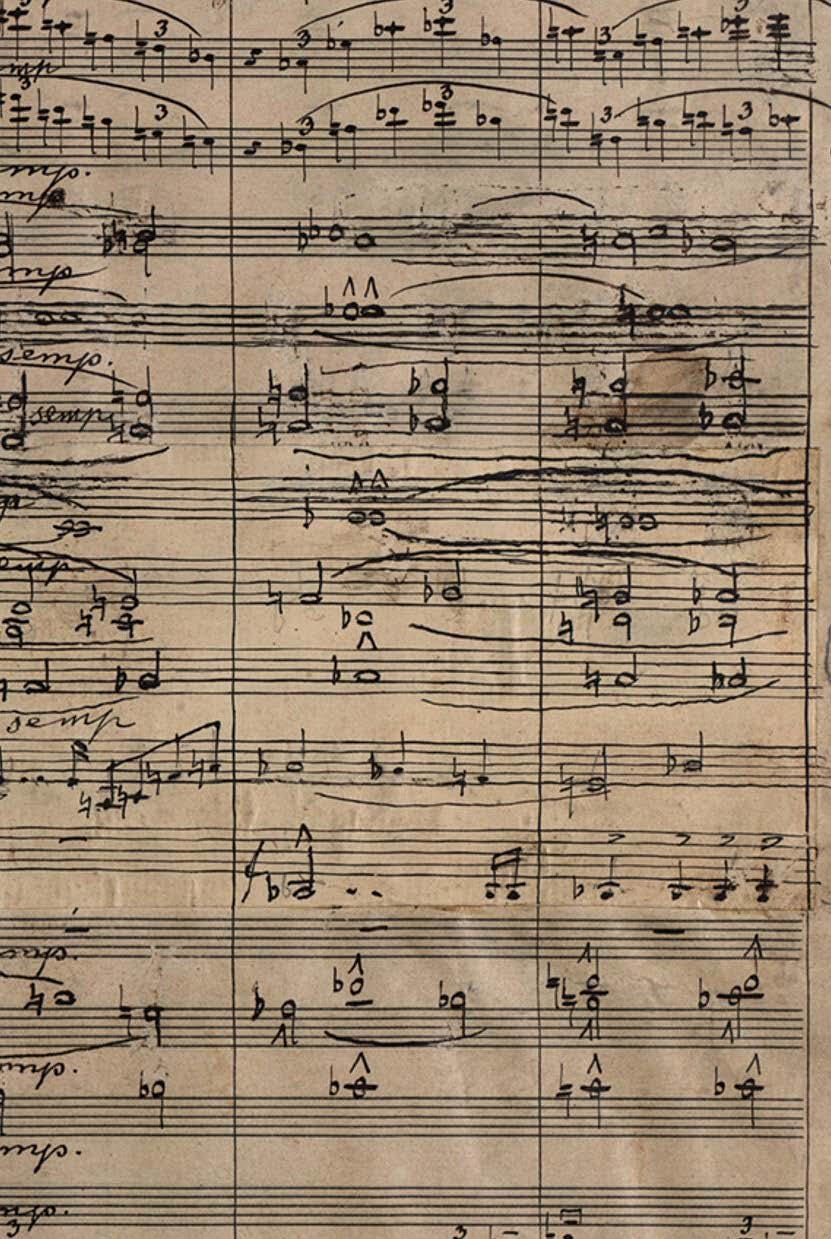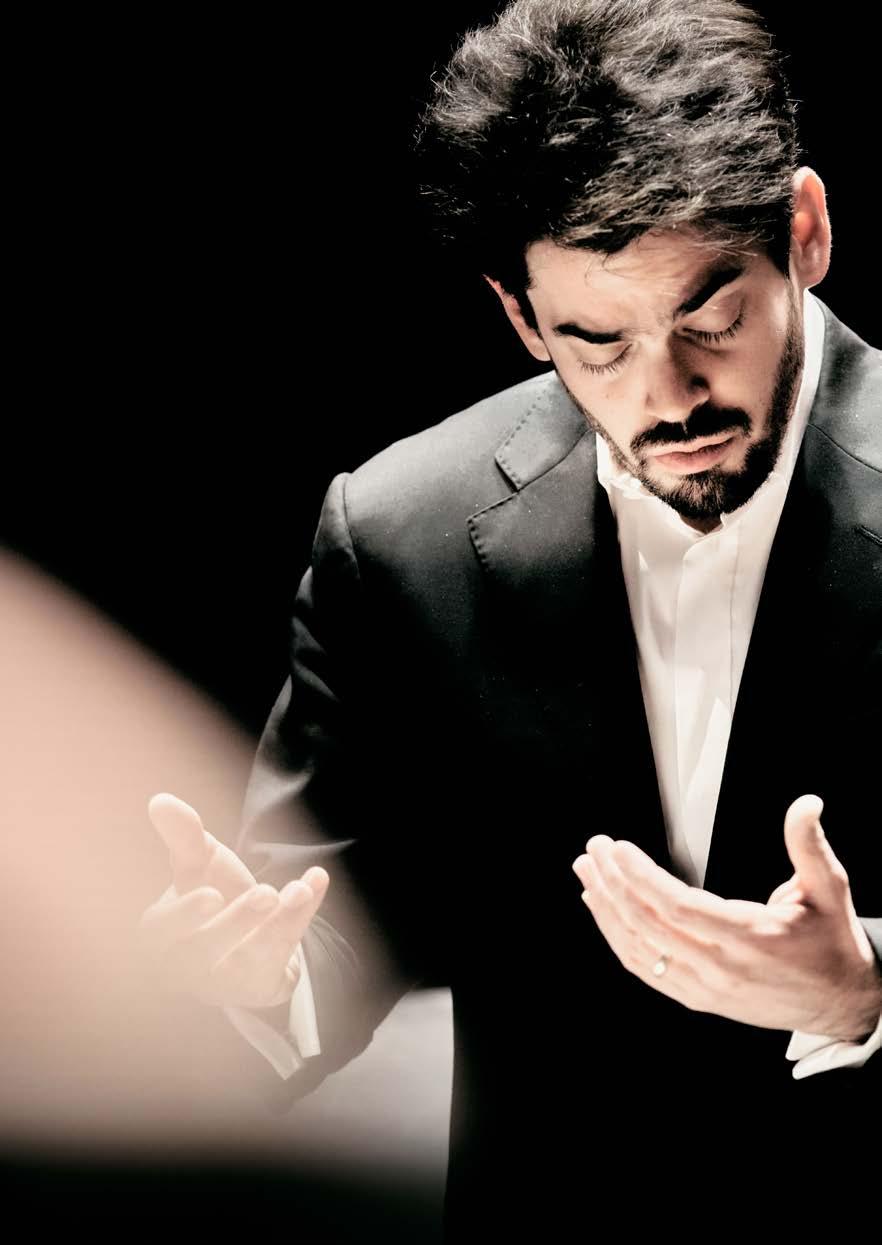

Pragramme Notes

Bruckner 8 with Lahav Shani
Fr 22 November 2024 • 20.15
PROGRAMME

conductor Lahav Shani
Anton Bruckner (1824–1896)
Symphony No. 8 in C minor (1887/1890)
• Allegro moderato
• Scherzo: Allegro moderato - Trio: Langsam
• Adagio: Feierlich langsam; doch nicht schleppend
• Finale: Feierlich, nicht schnell
Concert ends at around 22.00
Most recent performance by our orchestra:
Feb 2016, conductor Yannick NézetSéguin
One hour before the start of the concert, Philip Ruitenberg will give an introduction (in Dutch) to the programme, admission €7,50. Tickets are available at the hall, payment by debit card. The introduction is free for Vrienden.
Cover: Photo Guille Pozzi
Crescendo sempre (First movement, five bars before rehearsal mark F): page from the manuscript of Bruckner’s Symphony No. 8 (1890). Coll. Österreichische Nationalbibliothek

Anton Bruckner in his study, around 1892.
Photo Ludwig Grillig, coll. Österreichische Nationalbibliothek

Music for future generations
The life of Anton Bruckner was certainly not carefree. In particular, he experienced immense self-doubt. Great joy could vanish into deep despair whenever he heard any criticism of his music.
Finally he earned recognition: Bruckner can rarely have felt better than after the first performance of his Seventh Symphony. The première in Leipzig was an immediate and huge success; its reprise in Munich was nothing less than a triumph. It must have filled the composer with self-confidence for his Eighth Symphony, on which he had already been working the last two months. On 1 October 1884 he completed the sketch of the first movement; three years later the gargantuan symphony was complete. The greatest work he had ever composed.
Bruckner sent the score to his ‘artistic father’ Hermann Levi, who had conducted the much-lauded second performance of his Seventh. It would have been better had the poor composer not done so. ‘I have studied the work for days on end, but I cannot feel at one with it. I find the instrumentation impossible and what shocks me the most is its similarity to the Seventh’, came the verdict from the Hofkapellmeister.
The criticism hit hard. Bruckner fell into a deep depression. Fortunately, as in the past, it was a condition he quickly overcame. Within two months he notified Levi that he had decided
to revise his Eighth Symphony. The revision would occupy him for a further two years. Finally, on 10 March 1890, he wrote the words ‘completely finished’ in his score. The second version of the Eighth Symphony was a reality.
Monumentality
At certain points in the work the revisions were very striking. Bruckner’s first movement, which originally ended in loud exuberance, now dissipates into a wonderful, gentle whisper of an ending. He incorporated a completely new trio into the scherzo: this slow middle section pointed subtly towards the symphony’s third movement. This adagio, and the last movement, also underwent substantial changes. In addition, in many parts of the symphony Bruckner revised the instrumentation.
What remained unchanged, however, was the monumentality of this symphony and the elaborate interweaving of the thematic material. Everything played thereafter, as varied as it sounds, develops organically from the first theme, which in turn makes reference to Wagner’s opera Siegfried. Bruckner emphasises this coherence by reintroducing the themes of the preceding movements into the final movement. This final movement was the principal reason for the composer to describe this symphony as a ‘mystery’. ‘The finale is way too long’, he conceded. ‘It is meant for future generations, and especially for friends and connoisseurs.’ It is as though he knew he was ahead of his time.
Opportunism
Bruckner gave his audience a guide to the basic ideas underpinning the different movements. He explained that the opening movement was intended as an announcement of death, ending with a kind of ‘surrender’. The scherzo depicts the ‘Deutscher Michel’, a figure representing the national character of the German people, symbolising single-mindedness and a peasantlike naivety. The adagio is a veiled declaration of love after the composer had ‘looked too deeply into the eyes of a young woman’. The last movement describes a meeting between the Emperor of Austria and the Russian Czar, involving ‘trotting Cossacks, military music and fanfares.’ This enabled Bruckner to represent elements of Viennese folk music in both the scherzo and last movement.
Bruckner dedicated this second, completed version of the symphony to Emperor Franz Joseph I of Austria. There was some opportunistic motive behind this: the emperor in return financed the publication of the work, and would, so Bruckner hoped, protect him from the behemoth of all critics, Eduard Hanslick.
Superlatives
In the end, such protection proved unnecessary. On 18 December 1892, the first performance of the Eighth Symphony by the Vienna Philharmonic, conducted by Hans Richter, was as much a success as the premiere of the Seventh had been. Hugo Wolf, music critic with the Wiener Salonblatt, struggled to find the superlatives. He described the event as ‘a complete triumph of light over darkness’, and the work as ‘the creation of a colossus that in terms of physical and spiritual scope exceeded all other symphonies of the master’. And even the feared Hanslick, despite references to ‘a nightmarish caterwauling style’ and the symphony being a ‘poor invention’, was
otherwise mild by his own standards and even indirectly acknowledged the greatness of the work. Albeit that he signed off, having noted the ‘thunderous ovation’, with a malicious aside: ‘Waving handkerchiefs from the standing audience, countless calls to return to the platform, laurel wreaths. For Bruckner the concert was indeed a triumph. But whether Richter did his public a similar favour is doubtful. The programme appears to have been intended to benefit only a noisy minority.’
Hanslick, despite references to ‘a nightmarish caterwauling style’ and the symphony being a ‘poor invention’, was otherwise mild by his own standards
Whereupon Hanslick suggested, as Bruckner himself had cautioned, that the time had not yet come for this symphony. The same observation would ring true some twenty years later, with the Dutch premiere of the work by the Concertgebouw Orchestra. Whilst one newspaper critic cheered the work as loudly as Hugo Wolf had done, another noted that many audience members left the concert hall before the last movement.
Since then, the Eight Symphony has come good, even though the debates about its different variations – not just the Urfassung from 1887 and the 1890 version being performed in this programme, but also ‘improved’ versions from Robert Haas (1932), Leopold Nowak (1955) and most recently Paul Hawkshaw (2017) – have not died down. For the time being, the 1890 version seems closest to expressing Bruckner’s ideas for this majestic symphony.
Paul Janssen

Lahav Shani chief conductor
Born: Tel Aviv, Israel
Current position: chief conductor Rotterdam Philharmonic Orchestra; music director Israel Philharmonic Orchestra; chief conductor designate Münchner Philharmoniker (from 2026)
Before: principal guest conductor Vienna Symphony Orchestra
Education: piano at the Buchmann-Mehta School of Music Tel Aviv; conducting and piano at the Academy of Music Hanns Eisler
Berlin; mentor: Daniel Barenboim
Breakthrough: 2013, First Prize Gustav Mahler International Conducting Competition in Bamberg
Subsequently: guest appearances Wiener Philharmoniker, Berliner Philharmoniker, Gewandhaus Orchester, Münchner
Philharmoniker, Symphonieorchester des Bayerischen Rundfunks, London Symphony Orchestra, Boston Symphony Orchestra, Chicago Symphony Orchestra, Philadelphia Orchestra, Royal Concertgebouworchestra
Debut Rotterdam Philharmonic: 2016
Photo: Eduardus Lee
Musicians Agenda
Music for Breakfast 2
Sun 8 December 2024 • 10.30
Rotterdam, RDM Kantine For musicians and programme see rpho.nl
Fri 13 December 2024 • 20.15
Sun 15 December 2024 • 14.15
conductor Tarmo Peltokoski
soprano Suvi Väyrynen
choir Netherlands Radio Women’s Choir
Holst The Planets
Vaughan Williams Sinfonia Antarctica
Proms: The Nutcracker
Thu 19 December 2024 • 20.30
Sat 21 December 2024 • 20.30
conductor Dmitry Matvienko children’s choir Academy of Vocal Arts
Tchaikovsky The Nutcracker (selection)
Fri 20 December 2024 • 20.15
Sun 22 December 2024 • 14.15
conductor Reinhard Goebel
soprano Elisabeth Breuer
alto Anna Lucia Richter
tenor Laurence Kilsby
bass Felix Mischitz
choir Laurens Collegium
Bach Weihnachtsoratorium (Pt. 1, 4 and 5)
Chief Conductor
Lahav Shani
Honorary Conductor
Yannick Nézet-Séguin
Principal Guest Conductor
Tarmo Peltokoski
First Violin
Marieke Blankestijn, concertmeester
Quirine Scheffers
Hed Yaron Meyerson
Saskia Otto
Arno Bons
Rachel Browne
Maria Dingjan
Marie-José Schrijner
Noëmi Bodden
Petra Visser
Sophia Torrenga
Hadewijch Hofland
Annerien Stuker
Alexandra van Beveren
Marie Duquesnoy
Second Violin
Charlotte Potgieter
Frank de Groot
Laurens van Vliet
Elina Staphorsius
Jun Yi Dou
Bob Bruyn
Eefje Habraken
Help us with your review
Do you have a moment? You can help us by leaving a Google review. It will only take a minute: scan the QR code below and let us know what you think of our orchestra. Thank you!

Maija Reinikainen
Babette van den Berg
Melanie Broers
Tobias Staub
Sarah Decamps
Viola
Anne Huser
Roman Spitzer
Galahad Samson
José Moura Nunes
Kerstin Bonk
Janine Baller
Francis Saunders
Veronika Lénártová
Rosalinde Kluck
León van den Berg
Olfje van der Klein
Jan Navarro
Cello
Emanuele Silvestri
Joanna Pachucka
Daniel Petrovitsch
Mario Rio
Eelco Beinema
Carla Schrijner
Pepijn Meeuws
Yi-Ting Fang
Double Bass
Matthew Midgley
Ying Lai Green
Jonathan Focquaert
Robert Franenberg
Harke Wiersma
Arjen Leendertz
Ricardo Neto
Javier Clemen Martínez
Flute
Juliette Hurel
Joséphine Olech
Manon Gayet
Flute/Piccolo
Beatriz Da Baião
Oboe
Karel Schoofs
Anja van der Maten
Oboe/Cor Anglais
Ron Tijhuis
Clarinet
Julien Hervé
Bruno Bonansea
Alberto Sánchez García
Clarinet/ Bass Clarinet
Romke-Jan Wijmenga
Bassoon
Pieter Nuytten
Lola Descours
Marianne Prommel
Bassoon/ Contrabassoon
Hans Wisse
Horn
David Fernández Alonso
Felipe Freitas
Wendy Leliveld
Richard Speetjens
Laurens Otto
Pierre Buizer
Trumpet
Alex Elia
Simon Wierenga
Jos Verspagen
Trombone
Pierre Volders
Alexander Verbeek
Remko de Jager
Bass Trombone
Rommert Groenhof
Tuba
Hendrik-Jan Renes
Percussion
Danny van de Wal
Ronald Ent
Martijn Boom
Adriaan Feyaerts
Harp
Albane Baron
